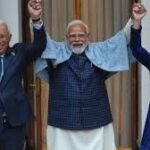Future of Bangladesh after Sheikh Hasina’s departure amid prolonged unrest, leaving the country in the hands of the army or Islamic radicals, the political future appears highly uncertain and fraught with significant challenges. This state of anarchy, with no clear leadership and competing forces vying for control, poses serious risks for the stability and future governance of Bangladesh.
Sheikh Hasina’s departure marks a pivotal moment in Bangladesh’s political history. Her tenure, characterized by economic growth and infrastructural development, was also marred by accusations of authoritarianism and political repression. The prolonged unrest leading to her exit likely stemmed from a combination of political dissatisfaction, economic grievances, and possibly an intensifying radical Islamist insurgency. The immediate aftermath of her departure would see a power vacuum, with the army and Islamic radicals emerging as the primary contenders for control.
Historically, the military in Bangladesh has been a significant political actor, with a record of direct rule and substantial influence over civilian governments. In the current scenario, the military might initially step in to restore order, citing the need to stabilize the country and prevent further chaos. However, the military’s intervention, while potentially calming immediate violence, could lead to a prolonged period of martial law or military-dominated governance.
If the military assumes control, it would likely prioritize restoring law and order, securing key infrastructure, and suppressing radical elements. The military might install a technocratic government to manage day-to-day affairs while it retains overarching control. This period could see a suspension of democratic processes, with political activities curtailed and dissent suppressed.
The military’s governance could bring temporary stability, especially if it manages to curb violence and restore basic services. However, prolonged military rule poses significant risks to democratic institutions and civil liberties. History shows that military regimes often struggle with legitimacy, economic management, and human rights issues. Moreover, international pressure and potential sanctions could further complicate the situation, especially if the military is perceived as overly repressive.
In parallel, Islamic radicals, emboldened by the anarchy, could attempt to seize power or significantly influence the political landscape. Radical groups, which have long been a part of Bangladesh’s socio-political fabric, might capitalize on the unrest to advance their agendas. The rise of such groups could lead to increased violence and attempts to impose a more conservative or even extremist version of Islamic governance.
If Islamic radicals manage to gain control, either through force or by aligning with segments of the population disillusioned with secular politics, the country could see a dramatic shift in governance. An Islamist government might implement Sharia law, curtail women’s rights, and suppress secular and minority communities. This shift could lead to significant internal strife, as various factions vie for power and impose their ideologies.
The international community’s reaction to an Islamist regime would likely be swift and severe, with potential diplomatic isolation, sanctions, and humanitarian concerns. The economic implications would be profound, as foreign investments and aid could dwindle, exacerbating poverty and unemployment.
Despite the grim immediate outlook, pathways to democratic restoration exist, though they require significant effort and international support. A multi-faceted approach involving political dialogue, institutional reforms, and grassroots mobilization would be essential.
One potential pathway is initiating a national dialogue involving all major political factions, civil society, and international mediators. This dialogue would aim to establish a transitional government tasked with organizing free and fair elections. The inclusion of all stakeholders is crucial to ensure broad-based support and legitimacy.
Rebuilding and strengthening democratic institutions would be vital for long-term stability. This includes ensuring the independence of the judiciary, reforming the electoral commission, and guaranteeing media freedom. International organizations and democratic nations could play a supportive role by providing technical assistance and monitoring the reform process.
To mitigate the influence of radical elements, addressing the root causes of radicalization is essential. This involves improving economic opportunities, enhancing education, and promoting social inclusion. Programs aimed at de-radicalization and reintegration of extremists could also be part of a comprehensive strategy to reduce the appeal of radical ideologies.
The international community’s role in Bangladesh’s transition is pivotal. Diplomatic pressure, economic sanctions, and humanitarian aid are tools that can influence the political dynamics. Countries with strategic interests in South Asia, such as India, China, and the United States, would likely be key players in this process.
International actors could facilitate dialogue between conflicting parties and support the establishment of a transitional government. Diplomatic engagement would also involve ensuring that any interim government adheres to human rights standards and commits to a clear roadmap for democratic elections.
Economic support, including aid and investment, would be crucial to stabilize the economy and provide basic services. Conversely, targeted sanctions against individuals and groups responsible for violence and human rights abuses could pressure actors to engage in peaceful political processes.
In an optimistic scenario, sustained international pressure and internal dialogue lead to the establishment of a transitional government, followed by free and fair elections. A new democratic government, with broad-based support, embarks on comprehensive reforms to strengthen institutions and address socio-economic challenges. This scenario, though challenging, would pave the way for long-term stability and development.
In a less favorable scenario, either the military or Islamist radicals maintain control, leading to continued repression, economic decline, and international isolation. Prolonged authoritarian rule could exacerbate internal divisions and fuel further unrest, creating a cycle of violence and instability.
The worst-case scenario involves further fragmentation of the country, with various factions, including regional and ethnic groups, taking up arms against each other. This could lead to a protracted civil war, with devastating humanitarian consequences and a long-term impact on regional stability.
Bangladesh’s future, in the wake of Sheikh Hasina’s departure and the ensuing anarchy, is deeply uncertain. The interplay between military power and Islamic radicalism, along with the potential for democratic restoration, presents a complex and volatile situation. A concerted effort involving national dialogue, institutional reforms, and international support is essential to navigate this crisis and ensure a stable, democratic, and prosperous Bangladesh.





Leave a Reply